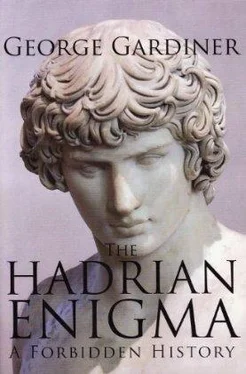George Gardiner - A Forbidden History.The Hadrian enigma
Здесь есть возможность читать онлайн «George Gardiner - A Forbidden History.The Hadrian enigma» весь текст электронной книги совершенно бесплатно (целиком полную версию без сокращений). В некоторых случаях можно слушать аудио, скачать через торрент в формате fb2 и присутствует краткое содержание. Жанр: Исторические приключения, на английском языке. Описание произведения, (предисловие) а так же отзывы посетителей доступны на портале библиотеки ЛибКат.
- Название:A Forbidden History.The Hadrian enigma
- Автор:
- Жанр:
- Год:неизвестен
- ISBN:нет данных
- Рейтинг книги:5 / 5. Голосов: 1
-
Избранное:Добавить в избранное
- Отзывы:
-
Ваша оценка:
- 100
- 1
- 2
- 3
- 4
- 5
A Forbidden History.The Hadrian enigma: краткое содержание, описание и аннотация
Предлагаем к чтению аннотацию, описание, краткое содержание или предисловие (зависит от того, что написал сам автор книги «A Forbidden History.The Hadrian enigma»). Если вы не нашли необходимую информацию о книге — напишите в комментариях, мы постараемся отыскать её.
A Forbidden History.The Hadrian enigma — читать онлайн бесплатно полную книгу (весь текст) целиком
Ниже представлен текст книги, разбитый по страницам. Система сохранения места последней прочитанной страницы, позволяет с удобством читать онлайн бесплатно книгу «A Forbidden History.The Hadrian enigma», без необходимости каждый раз заново искать на чём Вы остановились. Поставьте закладку, и сможете в любой момент перейти на страницу, на которой закончили чтение.
Интервал:
Закладка:
The Syrian hetaera was smitten silent for a few moments. No one had ever before asked her such a generous-minded question. No one was interested. Except perhaps one single person, she recalled. She stumbled her honest reply.
"I think, master, I wish to leave my trade before I am too old to attract custom or am afflicted with a deadly pox. I hope to devote myself instead to creating beauty aids and perfumes for market. I already know the crafts of their manufacture; but I need the capital to buy the necessary tools and time to create sufficient stock and to rent a suitable trading shop. I have monies stored away securely, but it is only half the sum I am likely to require. You see, I have thought through this matter well during many long nights satisfying a client's pleasures."
Clarus and Strabon returned to the courtyard.
"What about marriage? A husband? A family?" Suetonius continued. "Does this appeal to you?"
Surisca grew clouded in her response.
"Very few men seek the companionship of women of my profession, my lord. My trade breaks trust. Though there are those who wish to live off the earnings of such as I. But here in the East a woman loses her wealth when she falls under a husband's aegis. I have worked far too hard and long for my wealth to be so easily acquired by another. I've heard it said women at Rome possess greater freedom of property ownership in retaining their wealth in marriage? Is this so, master?"
Clarus intruded on this pragmatic conversation.
"Where are we with our investigation?" he demanded. "What have we learned? In an hour we join Caesar's assembly, and we're likely to have few opportunities to interview others after his ceremony. So we're back to: Why did Antinous die? And: was it an accident, suicide, or murder?"
"Well, what do you think yourself, Septicius?" Suetonius asked.
"I don't really know. It's very complicated and I sense we're missing something essential. Two days and nights is insufficient time."
"But, cui bono? Who benefits from the death?" Suetonius probed.
"Other than a mysterious pack of 'stalking wolves', it seems no one except the Bithynian himself benefits. Perhaps he's died in an act of sacrifice," Clarus proposed.
"Or possibly Caesar via an agent, if he's party to sacrifice and sorcery?" Surisca murmured carefully. Clarus was disturbed by such talk.
A figure appeared at the courtyard accompanied by Secretary Vestinus. It was Geta. He had overheard the final comment.
"You hold Caesar to be under suspicion, colleagues? But you forget too many others. The empress Vibia Sabina, for example? She would do anything to upset our Caesar on principle," Geta proposed. "Perhaps she hired renegade Nubian freebooters to create mischief with her husband's loved one? Or the security chief Tribune Macedo on behalf of Senate forces in Rome, such as his master Turbo, the Praetorian Prefect? Or a faction of the Senate, or an ambitious Legion commander or two?
Or even me? After all, I'm the closest to both our Caesar and the dead lad. Perhaps I have some hidden advantage to gain?"
Geta's and Surisca's eyes locked momentarily. A message of welcome flashed silently between them. Suetonius felt immediately cuckolded once again, but continued nevertheless.
"But do you have a motive, Dacian?" Suetonius smoothed. "In what way could you possibly benefit from the death of the Bithynian?"
"Enough!" Clarus demanded. "Our time is running out. You called for Geta. He stands before you, Suetonius. Make your enquiries."
The biographer gathered his wits about him.
"You know all those of the Household well, Geta. You know their personalities and habits. We have received a puzzling message whose coded terms we cannot interpret. We wish you to hear the message and for you to offer your view on who it best describes in the Household or its hangers-on."
The Special Inspector turned to Strabon.
"Read the Oracle's message. Read his words. Let Geta decide who it identifies or what the message is being communicated."
The scribe delved into his collection of wax notebooks and drew the recent block from his basket. He scanned his scratchings on the wax and began declaiming its notation out loud.
"The son of Apollo ascended to the sun. The sun incinerated the youth. The wild forces of Eros overcame the measured power of Aphrodite. A hidden secret unleashed the chaos of Eros so stalking wolves could devour their prey."
Geta suddenly sat bolt upright. "Stalking wolves?" he exclaimed. Strabon continued.
"The son of Apollo bled into Darkness. Stalking wolves sipped his blood. The son of Apollo made an offering at the altar of his brother Asclepius. He offered his only true spoils to the altar, his life. Wolves devoured the spoils with relish. A wolf's sword exacts its revenge. A she-wolf's delusion drinks it fill. But the path to the sacrificial altar was smoothed by a king's secret."
"A wolf's sword?! Revenge?! A she-wolf drinks blood?! A king's secret?" Geta exclaimed with increasing panic.
"On a journey of justice, identify the She Wolf. Apprehend the wolves. Send them to the Underworld of an alien god."
"The Underworld! An alien god?!" Geta was rising slowly from his seat, alarmed.
"The Baal of the East who came to the West. The Drinker of Blood. The Wolf Deity…"
Strabon's reading was drowned by Geta's cry of "The Drinker of Blood!" but he continued nevertheless. Geta groaned a mighty howl as he staggered to his feet. The group was rigid in bewilderment at his action. Surisca drew to his side to steady the man's faltering steps. Strabon continued.
"Fire purifies. The son of Apollo rises with the dawn, when the king's heart bursts with anguish."
Strabon put down the wax tablet as all eyes settled on the Dacian who was standing supported on the Syri's arm. He was seriously distressed.
"The Baal of the East! Where did you hear these words?! Who spoke them to you?!" he demanded.
"Quiet, Geta. Settle down. Take it easy," Suetonius soothed. "We're here to ask you what you know of this strange message. We want you to tell us the meaning of these words or the persons they may be referring to. We're at a loss to shed light on the thing.
Who are the wolves? Who is the She Wolf? Why is the god of healing, Asclepius, in this? Who is drinking blood? What blood? Why? We believe it all has something to do with the death of Antinous."
Geta fell into a chair nearby and held his head in his hands. Surisca discreetly tried to comfort him. He muttered to himself in a foreign tongue, possibly the language of The Getae people. He turned to Suetonius to offer answers.
"Your message is from a dire enemy of Zalmoxis. Zalmoxis is the Baal of the East who came to the West. Zalmoxis is my holy forebear of many generations ago. I am said to have the blood of Zalmoxis streaming my veins. The faded tattooed circles upon my face are the insignia of this heritage.
The god Zalmoxis lives in his Underworld of the dead. He awaits his Dacian devotees in his Underworld. They join him in the infinite Night of Zalmoxis and his eternal shaman's dance. In life Zalmoxis is worshipped with blood, the fluid of life. Like a forest's stalking wolf we Dacians sacrifice chickens, sheep, steers, and horses for Zalmoxis to savor their fresh blood. The Getae drain an animal's life-blood in ritual adoration and drink it as strengthening food.
In war it is the blood of the enemy that's sipped. The blood of captives is drained from their living bodies and venerated and consumed directly by the devotees, or indirectly by Zalmoxis via the putrefaction process. Such blood gives the Getae the wild strengths of a wolf. The Getae are Wolf Warriors. Like wolves, we suckle on blood."
"So, who is the wolf and She-wolf of the message? Are you the wolf whose sword has exacted revenge?" Suetonius ventured daringly.
Читать дальшеИнтервал:
Закладка:
Похожие книги на «A Forbidden History.The Hadrian enigma»
Представляем Вашему вниманию похожие книги на «A Forbidden History.The Hadrian enigma» списком для выбора. Мы отобрали схожую по названию и смыслу литературу в надежде предоставить читателям больше вариантов отыскать новые, интересные, ещё непрочитанные произведения.
Обсуждение, отзывы о книге «A Forbidden History.The Hadrian enigma» и просто собственные мнения читателей. Оставьте ваши комментарии, напишите, что Вы думаете о произведении, его смысле или главных героях. Укажите что конкретно понравилось, а что нет, и почему Вы так считаете.












